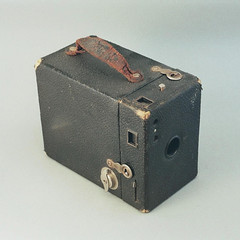Difference between revisions of "Hawk-eye No. 2"
m (→Origins: McKeown link to template) |
(miscellany) |
||
| Line 6: | Line 6: | ||
== Origins == | == Origins == | ||
| − | The original Hawk-eye cameras were made by the Boston Camera Co., which was taken over by Blair Camera Co. in 1890 | + | The original Hawk-eye cameras were made by the Boston Camera Co., which was taken over by Blair Camera Co. in 1890, in turn taken over By Eastman Kodak in 1899. This is the reason why there's no Hawk-eye No. 1 in the Kodak list: that camera, a 4×5 inch plate camera, was made by the original company.'' source'': {{McKeown}} |
== Cardboard and leatherette== | == Cardboard and leatherette== | ||
| Line 12: | Line 12: | ||
[http://www.flickr.com/photos/50678983@N00/168880905/in/pool-camerapedia http://static.flickr.com/65/168880905_9be4b730b3_t.jpg] | [http://www.flickr.com/photos/50678983@N00/168880905/in/pool-camerapedia http://static.flickr.com/65/168880905_9be4b730b3_t.jpg] | ||
</div> | </div> | ||
| − | It probably wasn't a very expensive camera. | + | It probably wasn't a very expensive camera. The Hawk-eye No. 2 has a cardboard body (on the example in the photograph, the cardboard is showing on the edges). The body is covered with black leatherette and it has a real leather strap on top. They were made from 1913 onwards and this particular one was produced in Great Britain (see leatherette imprint). |
| − | It uses [[120 film]] to make 6×9 cm negatives. Since it was made in Britain, 2 1/4×3 1/4 inch is probably a better way of describing the format | + | It uses [[120 film]] to make 6×9 cm negatives. Since it was made in Britain, 2 1/4 × 3 1/4 inch is probably a better way of describing the format. |
== Viewfinder and lens == | == Viewfinder and lens == | ||
| Line 20: | Line 20: | ||
[http://www.flickr.com/photos/50678983@N00/168880906/in/pool-camerapedia http://static.flickr.com/63/168880906_bb2cf34093_t.jpg] | [http://www.flickr.com/photos/50678983@N00/168880906/in/pool-camerapedia http://static.flickr.com/63/168880906_bb2cf34093_t.jpg] | ||
</div> | </div> | ||
| − | The | + | The Hawk-eye No. 2 has two viewfinders. Both are prism finders, one seen from above and the other from the right side of the camera. There is a simple meniscus lens. An ad placed inside the camera advises you to insist on Kodak [[120 film]], either regular or Verichrome<!-- "Verichrome Pan"? -->. Verichrome Pan <!-- "Verichrome"? -->is of course not a colour film, but a black and white film with better sensivity to red (see link). |
<div style="clear:both;"> | <div style="clear:both;"> | ||
| Line 29: | Line 29: | ||
[http://www.flickr.com/photos/50678983@N00/168880908/in/pool-camerapedia http://static.flickr.com/51/168880908_911a7ac2b6_s.jpg] | [http://www.flickr.com/photos/50678983@N00/168880908/in/pool-camerapedia http://static.flickr.com/51/168880908_911a7ac2b6_s.jpg] | ||
</div> | </div> | ||
| − | Film is wound | + | Film is wound with this double lever, turned in the direction of the arrow. Frames are counted via a red window in the back. Opening the camera is less obvious. Even after opening the eye-locks, the two parts stay firmly together. Only after pulling out the double winding lever will they come apart. |
| − | |||
== Shutter and aperture == | == Shutter and aperture == | ||
| − | The shutter is of the simple "guillotine" type. It has just one speed | + | The shutter is of the simple "guillotine" type. It has just one speed, which sounds like 1/30s. Two apertures are available through a pull-out strap on the top of the box. This will put openings of different diameters in the pathway of the light. |
| − | |||
| − | |||
| − | |||
| − | |||
== Links == | == Links == | ||
Revision as of 00:53, 18 June 2006
Contents
Origins
The original Hawk-eye cameras were made by the Boston Camera Co., which was taken over by Blair Camera Co. in 1890, in turn taken over By Eastman Kodak in 1899. This is the reason why there's no Hawk-eye No. 1 in the Kodak list: that camera, a 4×5 inch plate camera, was made by the original company. source: McKeown
Cardboard and leatherette
It probably wasn't a very expensive camera. The Hawk-eye No. 2 has a cardboard body (on the example in the photograph, the cardboard is showing on the edges). The body is covered with black leatherette and it has a real leather strap on top. They were made from 1913 onwards and this particular one was produced in Great Britain (see leatherette imprint). It uses 120 film to make 6×9 cm negatives. Since it was made in Britain, 2 1/4 × 3 1/4 inch is probably a better way of describing the format.
Viewfinder and lens
The Hawk-eye No. 2 has two viewfinders. Both are prism finders, one seen from above and the other from the right side of the camera. There is a simple meniscus lens. An ad placed inside the camera advises you to insist on Kodak 120 film, either regular or Verichrome. Verichrome Pan is of course not a colour film, but a black and white film with better sensivity to red (see link).
Transport and opening the camera
Film is wound with this double lever, turned in the direction of the arrow. Frames are counted via a red window in the back. Opening the camera is less obvious. Even after opening the eye-locks, the two parts stay firmly together. Only after pulling out the double winding lever will they come apart.
Shutter and aperture
The shutter is of the simple "guillotine" type. It has just one speed, which sounds like 1/30s. Two apertures are available through a pull-out strap on the top of the box. This will put openings of different diameters in the pathway of the light.




